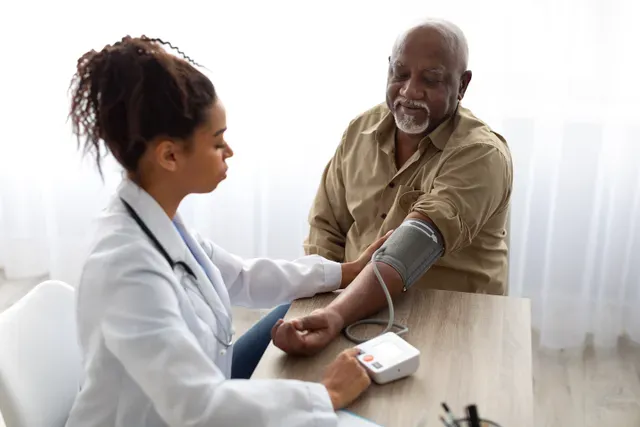Hypertension Specialists in Newark, East Orange, Bloomfield & Hackettstown, NJ
Nirvana Healthcare – Expert High Blood Pressure Management
Are you searching for a hypertension specialist near you? At Nirvana Healthcare Management Services, our primary care doctors in Newark, East Orange, Bloomfield and Hackettstown, NJ specialize in high blood pressure treatment and prevention to help you maintain a health heart and lower your risk of complications.
Call 973-672-8573 or visit nirvanahealthcare.com to schedule an appointment today!
What is Hypertension? (High Blood Pressure)
Hypertension is a chronic condition in which the force of blood against your artery walls remain too high. If left untreated, it can lead to heart disease, stroke, kidney failure, and other serious health issues.
Why is Hypertension Called the “Silent Killer”?
Many people with high blood pressure experience no symptoms until serious complications arise. In some cases, headaches, shortness of breath, or nosebleeds may occur in the later stages.
Regular blood pressure screenings are essential for early detection and prevention!
Hypertension Risk Factors
Certain factors can increase your risk of developing high blood pressure, including:
- Age (risk increases as you get older)
- Family history of hypertension
- Being overweight or obese
- Sedentary lifestyle (lack of exercise)
- Smoking and excessive alcohol consumption
- High sodium diet
At Nirvana Healthcare, we offer expert hypertension treatment in Newark, East Orange, Bloomfield, and Hackettstown, NJ to help manage and reduce your risk.
How We Diagnose & Treat Hypertension
Blood Pressure Readings & Diagnosis
- Normal Blood Pressure: Below 120/80 mm Hg
- Elevated Blood Pressure: 130/80 mm Hg or higher
Our primary care doctors use a blood pressure cuff to check your readings. If your numbers are elevated, we develop a personalized treatment plan tailored to your health needs.
Best Treatments for Hypertension
Lifestyle Changes for Lowering Blood Pressure
Before medication, lifestyle modifications are often recommended to help manage high blood pressure naturally:
- Regular Exercise: 30 minutes of walking, jogging, or strength training 5 times a week can significantly lower blood pressure.
- Healthy Diet: A low-sodium, high-potassium diet (fruits, vegetables, lean proteins) helps control blood pressure levels.
- Weight Management: Losing even 5-10% of body weight can reduce hypertension risks.
- Reduce Stress: Techniques like meditation, yoga, and breathing exercises can help keep your blood pressure stable.
- Quit Smoking & Limit Alcohol: Both raise blood pressure and increase the risk of heart disease.
Need help with a personalized hypertension management plan? Visit Nirvana Healthcare in Newark, East Orange, Bloomfield, or Hackettstown, NJ.
Medications for Hypertension Treatment
When lifestyle changes aren’t enough, our hypertension specialists prescribe medications to control high blood pressure.
Common blood pressure medications include:
- Diuretics (Water Pills): Help remove excess salt and fluids, lowering blood pressure.
- ACE Inhibitors: Relax blood vessels and reduce resistance, improving blood flow.
- Calcium Channel Blockers: Prevent calcium from entering blood vessel walls, keeping arteries relaxed.
- Beta Blockers: Reduce heart rate and workload on the heart, decreasing blood pressure.
Every patient is different – we create customized medication plans to suit your needs!
Hypertension Complications: Why Early Treatment is Critical
Uncontrolled high blood pressure can lead to:
- Heart attacks and strokes
- Chronic kidney disease
- Aneurysms
- Vision loss and eye disease
- Cognitive decline and dementia
Don’t wait – call 973-672-8573 to schedule an appointment with a hypertension specialist near you!
Why Choose Nirvana Healthcare for Hypertension Treatment?
- Comprehensive primary care and hypertension care in Newark, East Orange, Bloomfield, and Hackettstown, NJ
- Convenient locations near you
- Experienced and compassionate hypertension specialists
- Personalized treatment plans and lifestyle coaching
- Flexible appointment scheduling, including telehealth options
Call 973-672-8573 or visit nirvanahealthcare.com to book your consultation today!
FAQs About Hypertension Treatment
What is the fastest way to lower blood pressure?
- Reducing salt intake, exercising, and managing stress can quickly lower blood pressure naturally. Medications may be necessary for some patients.
How often should I check my blood pressure?
- If you have hypertension, check it at least once a day. If your blood pressure is normal, a check-up every 6-12 months is recommended.
Can hypertension be cured?
- Hypertension can’t be cured, but it can be controlled with lifestyle changes and medication.
When should I see a doctor for high blood pressure?
- If your blood pressure is consistently above 130/80, schedule an appointment for early intervention and treatment.
Call 973-672-8573 now to book a hypertension screening in Newark, East Orange, Bloomfield, or Hackettstown, NJ!

